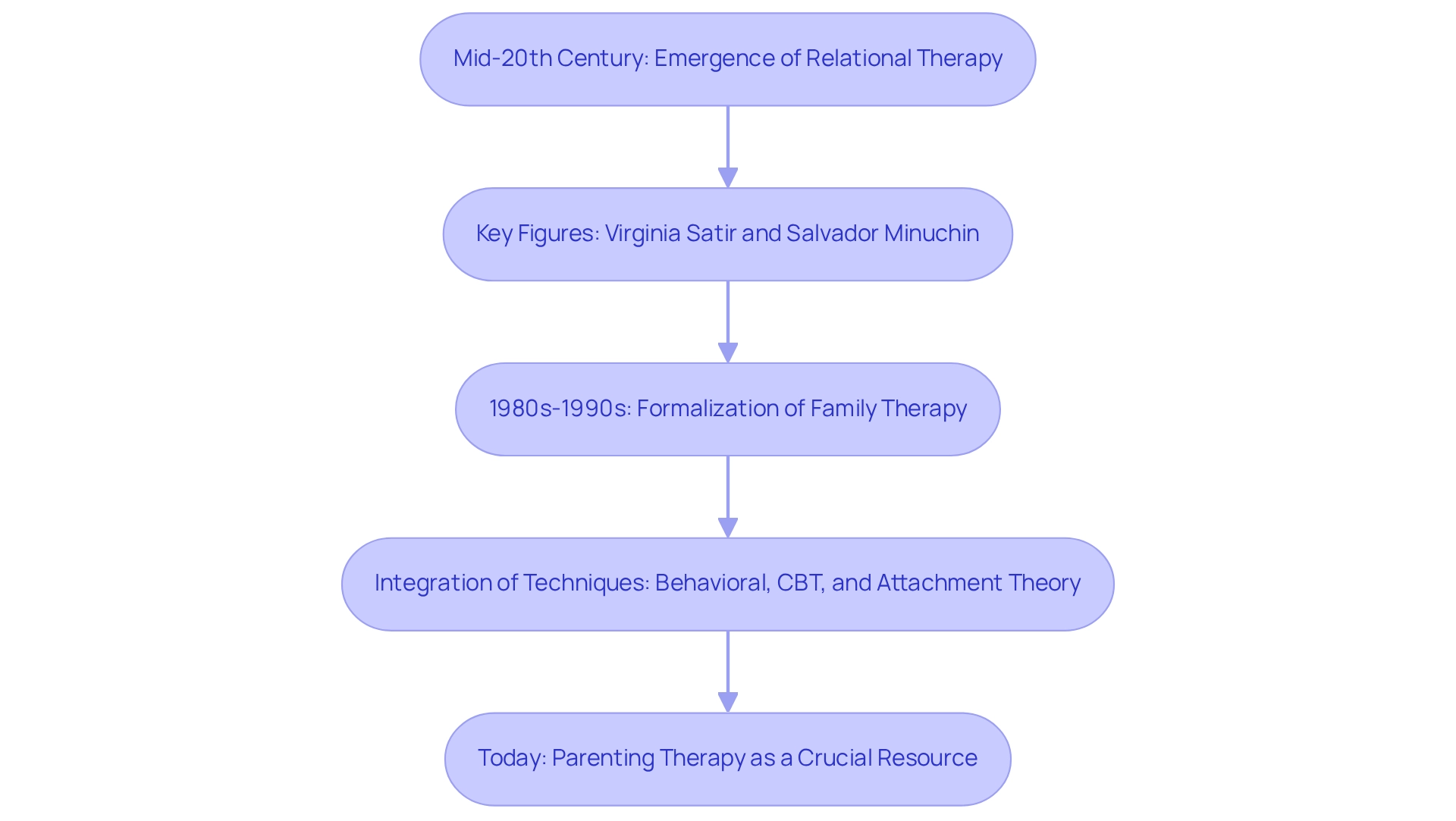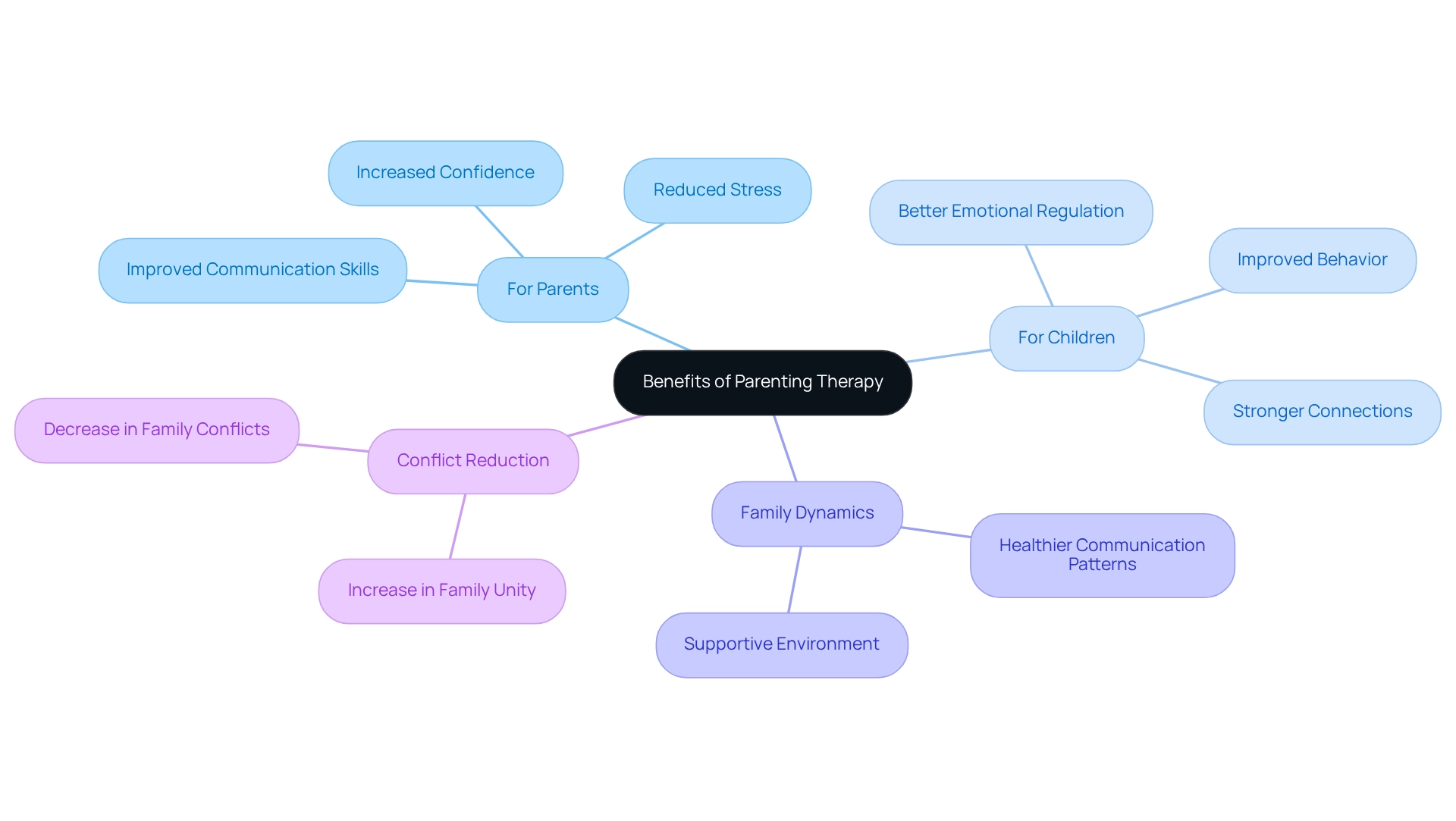Overview
Parenting therapy is a compassionate form of counseling designed to enhance caregivers' abilities and strengthen the bond between parents and children. Have you ever felt overwhelmed by the challenges of parenting? This therapy addresses specific issues such as behavioral concerns and anxiety, offering support to those who need it most. The article delves into the origins, techniques, and benefits of parenting therapy, highlighting its effectiveness in improving communication and reducing family conflict.
As we explore this further, you’ll discover how parenting therapy fosters a nurturing environment for both parents and children. Imagine a space where open dialogue flourishes, and understanding replaces frustration. By engaging in this therapeutic journey, families can cultivate healthier relationships and create a loving atmosphere at home.
In addition to this, the article emphasizes the importance of seeking help when needed. It’s a brave step towards healing and growth. Parenting therapy not only supports parents but also nurtures the emotional well-being of children, ensuring that everyone in the family feels valued and understood. Let this be an invitation for you to consider the positive changes that such support can bring into your life.
Introduction
In the intricate journey of parenthood, have you ever felt overwhelmed by the challenges that arise? Many parents find themselves seeking guidance through parenting therapy, a specialized counseling approach that not only enhances parenting skills but also strengthens the vital bond between parents and their children. As families navigate issues ranging from behavioral struggles to the stresses of postpartum life, parenting therapy emerges as a beacon of hope. It offers tailored strategies that foster resilience and emotional well-being.
With a growing recognition of its importance, this therapeutic practice has evolved significantly, integrating various techniques to address the unique dynamics within families. By exploring the origins, key components, and profound benefits of parenting therapy, we can gain a clearer understanding of its transformative power. This understanding paves the way for healthier family relationships and a nurturing environment for children, inviting you to consider the support available on this journey.
Define Parenting Therapy: An Overview
Parenting therapy is designed to help caregivers navigate the challenges of raising children. enhances caregiving abilities, strengthens parent-child bonds, and addresses specific difficulties such as behavioral issues, anxiety, and the pressures associated with parenting therapy. Unlike traditional counseling, which often focuses on personal challenges, family-centered support, including parenting therapy, emphasizes the dynamics within the household and equips caregivers with effective strategies to create a loving environment for their children.
At The Emerald Couch, we offer a variety of services tailored to meet the unique needs of families. This includes individual sessions for caregivers, family counseling, or a combination of both. Such flexibility allows us to address the specific challenges caregivers face, particularly during times of postpartum depression, anxiety, or trauma, through parenting therapy.
Recent data supports the effectiveness of parenting therapy, showing that many caregivers report improved connections with their children following therapeutic interventions. For instance, research shows that those who engage in parenting therapy often experience enhanced communication and reduced conflict among family members.
As we look ahead to 2025, there is a growing recognition of the importance of caregiver counseling. More practitioners are offering personalized interventions that cater to the distinct needs of families. These may include individual sessions, group counseling, or a blend of both, all under parenting therapy, ensuring a holistic approach to relational dynamics.
The aim of caregiving support extends beyond resolving immediate issues; it seeks to foster lasting resilience and emotional health in both parents and children. This parenting therapy nurtures parent-child relationships, benefiting the family unit and enhancing the overall mental well-being of parents. This, in turn, empowers them to navigate the challenges of parenthood with greater confidence and support.
Explore the Origins and Evolution of Parenting Therapy
The beginnings of child-rearing therapy can be traced back to the mid-20th century, a time when relational therapy emerged as a distinct area within psychotherapy. Pioneers like Virginia Satir and Salvador Minuchin played pivotal roles in shaping this discipline, emphasizing the critical nature of family dynamics in addressing individual psychological challenges. As societal views on child-rearing evolved, the necessity for specialized support for caregivers became increasingly evident, particularly for those grappling with postpartum challenges and anxiety.
By the 1980s and 1990s, family therapy began to formalize, integrating techniques from behavioral therapy, cognitive-behavioral therapy (CBT), and attachment theory. This evolution marked a significant shift in therapeutic practices, recognizing that could be cultivated through understanding rather than blame. Have you ever felt overwhelmed by your past? Statistics indicate that this shift enhances cooperation among relatives, fostering healing and growth.
Today, parenting therapy is recognized as a crucial resource for families facing various challenges, from addressing behavioral problems to navigating the complexities of co-parenting. Historical case studies demonstrate the transformative influence of these therapeutic approaches, reinforcing the notion that establishing a supportive atmosphere is essential for significant advancement in treatment. As we explore this further, remember that seeking help can be a vital step toward nurturing your family's well-being.

Examine Key Components and Techniques in Parenting Therapy
Parenting therapy includes several key components that can profoundly impact family dynamics. It includes:
By utilizing effective techniques such as role-playing, reflective listening, and cognitive restructuring, caregivers can gain a deeper understanding of their children's behaviors and enhance their responses. Have you ever felt overwhelmed by your child's disruptive behavior? Caregivers can learn to recognize triggers and create proactive strategies to tackle these challenges through parenting therapy, fostering a nurturing environment, as current best practices highlight the significance of communication skills training. This training has been shown to greatly improve caregiver-child interactions, leading to a remarkable 30% enhancement in behavioral outcomes for children when caregivers actively engage in the process. Moreover, have demonstrated lasting effectiveness. Research indicates that enduring behavioral changes can continue even after therapy ends, positively impacting both self-image and emotional health.
In addition to these techniques, therapists may integrate mindfulness practices, such as meditation and mindful breathing, to help caregivers manage stress and improve emotional resilience. Mindfulness serves as a powerful tool for enhancing awareness of thoughts and emotions, allowing caregivers to slow down and make deliberate choices in their interactions with their children. By focusing on both the guardian and child, these methods aim to create a more harmonious household atmosphere and promote healthier connections.
The therapeutic relationship itself is a catalyst for change. The qualities of the counselor can significantly influence positive outcomes, capitalizing on clients' internal strengths. This holistic approach not only addresses immediate behavioral issues but also incorporates parenting therapy to foster lasting growth and understanding within . As we explore these methods further, consider the positive changes they could bring to your family life.
Understand the Benefits and Impact of Parenting Therapy on Family Healing
Parenting counseling offers a multitude of benefits that can profoundly enhance the lives of both caregivers and children. Many parents share their experiences of improved communication skills, reduced stress, and a newfound confidence in their parenting abilities. Have you ever felt overwhelmed by the challenges of raising a child? You are not alone. As a result of these counseling sessions, children often exhibit better emotional regulation, improved behavior, and stronger connections with their caregivers.
Research indicates that families who engage in guidance sessions experience a notable decrease in conflicts and a surge in unity. For instance, studies reveal that parents involved in counseling report significant reductions in stress related to child-rearing, alongside an increase in positive interactions with their children. This nurturing approach creates a supportive environment that benefits everyone involved.
Furthermore, case studies highlight the critical role of family dynamics in mental well-being. Effective treatment can lead to healthier communication patterns and interactions, ultimately enriching the lives of both adolescents and their families. As we explore this further, consider how parenting therapy can foster a supportive environment that aids individual family members and nurtures a healthier family system as a whole. Together, let’s take steps towards .

Conclusion
Parenting therapy is a crucial resource for families as they navigate the intricate journey of raising children. By offering specialized support that enhances parenting skills and nurtures parent-child relationships, this therapeutic approach effectively addresses various challenges, including behavioral issues and the emotional strains of parenting. With a focus on the dynamics within the family unit, parents are equipped with effective strategies that foster resilience and create a loving environment.
As parenting therapy has evolved, it has embraced diverse techniques from behavioral and cognitive-behavioral therapies, highlighting the importance of understanding rather than placing blame. This evolution has led to significant improvements in family communication and cooperation, underscoring the necessity of specialized support for parents, especially during postpartum challenges.
Key components of parenting therapy, such as communication skills training and mindfulness practices, empower parents to manage stress and enhance their relationships with their children. The benefits are manifold—parents often report increased confidence and reduced stress, while children frequently exhibit better emotional regulation and behavior. Ultimately, parenting therapy not only promotes healing and understanding within families but also contributes to the overall mental well-being of both parents and children, paving the way for healthier family systems. Embracing this therapeutic approach can lead to transformative changes, ensuring that families thrive in their unique journeys. Have you considered how this support could impact your family? Seeking help may be the first step towards a more fulfilling and harmonious family life.
Frequently Asked Questions
What is parenting therapy?
Parenting therapy is a specialized counseling method aimed at helping caregivers navigate the challenges of raising children. It enhances caregiving abilities, strengthens parent-child bonds, and addresses specific difficulties such as behavioral issues and anxiety.
How does parenting therapy differ from traditional counseling?
Unlike traditional counseling, which often focuses on personal challenges, parenting therapy emphasizes the dynamics within the household and provides caregivers with effective strategies to create a loving environment for their children.
What services does The Emerald Couch offer for parenting therapy?
The Emerald Couch offers a variety of services tailored to families, including individual sessions for caregivers, family counseling, or a combination of both, to address specific challenges faced by caregivers, especially during times of postpartum depression, anxiety, or trauma.
What evidence supports the effectiveness of parenting therapy?
Recent data indicates that many caregivers report improved connections with their children following therapeutic interventions. Research shows that those engaged in parenting therapy often experience enhanced communication and reduced conflict among family members.
What is the future outlook for caregiver counseling and parenting therapy?
By 2025, there is a growing recognition of the importance of caregiver counseling, with more practitioners offering personalized interventions that cater to families' distinct needs, including individual sessions, group counseling, or a blend of both under parenting therapy.
What is the ultimate goal of parenting therapy?
The aim of parenting therapy extends beyond resolving immediate issues; it seeks to foster lasting resilience and emotional health in both parents and children, enhancing the overall mental well-being of parents and empowering them to navigate the challenges of parenthood with greater confidence.




